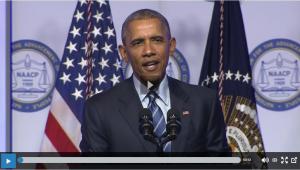In a 45-minute speech at the NAACP convention in Philadelphia Tuesday, President Obama laid out a far-reaching roadmap for criminal justice reform, including calls for reducing or eliminating mandatory minimum sentences, reviewing the use of solitary confinement, and eliminating barriers to reentry for former prisoners.

Obama recited the by now well-known statistics demonstrating American's over-reliance on incarceration: America is home to 5% of world's population but 25% of world's prisons; that African Americans and Latinos make up 30% of the U.S. population, but 60% of American inmates; that one out of three black men are now likely to serve time in prison, among others.
While the United States has 2 ½ million people behind bars, only about 200,000 of them are in the federal prison system that Obama has the ability to impact. Of those, 98,000 are doing time for drug offenses.
He used those stats to bolster his case for broad criminal justice reform, calling the criminal justice system an "injustice system."
"Any system that allows us to turn a blind-eye to hopelessness and despair, that's not a justice system, that's an injustice system," Obama said. "Justice is not only the absence of oppression, it's the presence of opportunity."
Washington has seen limited criminal justice reform during the Obama years, particularly with legislation partially undoing the crack-powder cocaine sentencing disparity and later actions making it retroactive. Then-Attorney General Eric Holder signaled to federal prosecutors that they should move away from mandatory minimums, and the Obama administration has asked federal drug prisoners to seek sentence commutations.
At the convention, Obama also touted initiatives including the Department of Justice's Smart on Crime program aimed at reducing the impact of our harsh laws, My Brother's Keeper, and the Clemency Project.
The president commuted the sentences of 46 drug offenders on Monday, and applications from some 30,000 more are in the pipeline.
Obama said the time was ripe for further reforms, citing bipartisan interest in the issue, and even mentioning the Koch Brothers and Kentucky Republican Sen. Rand Paul as allies in the fight. They made "strange bedfellows" with Democrats and the NAACP, he said, but that's what sometimes happens in politics.
"We're at a moment when some good people in both parties, Republicans and Democrats, and folks all across the country are coming together around ideas to make the system work smarter. To make it work better and I'm determined to do my part, wherever I can," Obama said a day earlier in announcing the sentence commutations.
On Thursday, Obama will continue his criminal justice-themed week with a visit to the federal prison in El Reno, Oklahoma -- the first visit ever to a federal prison by a sitting president. He is expected to meet with inmates there, and he told the NAACP crowd he met with four former prisoners -- one white, one Latino, and two black -- before taking to the podium there.
Comments
Nation of Suspects
America has become a nation of suspects. If you're not a cop, you're a drug suspect. We need to stop the incarceration of non-violent drug offenders, and take a step back. I remember a time when kids liked cops, and ran to them, not away from them.
Somehow when the drug war started we changed from peace officers, to law enforcement officers. Numbers of arrests became more important than having officers solve problems. When it came to felony drug arrests, they were easy. The more arrests, the more drug enforcement money.
It's time to change things, we have a new enemy today, the terrorist who threaten America. It's time to look at drug abuse as a medical problem, not a law enforcement problem.
Arizona prosecutors give drug offenders the bum rush ...
I am so impressed by President Obama and then, Bill Clinton, admitting the error of 1994 ....they have compassion for those who have an addiction problem. I have personally become consumed with hateful feelings toward law enforcement officers and prosecuting attorneys. I am 67 years old and have lived in Arizona all my life - I am embarrassed for Arizona. The prosecuters threaten and coerce drug offenders into plea agreements and deprive citizens of a trial by a jury. Judges are now useless and unable to use their wisdom to sentence appropriately for the individual before them in their court rooms. I have personally seen the "bums rush" through the court in Yavapai County. Mandatory minimums, truth in sentencing, and presumptive sentences are a ploy to keep the private prison profiteers satisfied. Our new governor accepted campaign money from the private prison industry - - the prison riot brought some attention but, no worries, the prison director is investigating himself and will likely find a way to sweep this under the rug and then carry on as usual. Non-violent, victimless drug offenses have burgeoned prisons and the sad part is little or no correction is done.....just cheap labor ..... having the prisoners work in the communities for 20 cents an hour. Drug addiction is a public health problem, treated by behavior modification. Is it any wonder, citizens have come to hate law enforcers.....the laws are extreme and the charges are serious felonies --- that put citizens in prison for ridiculously long periods of time.
Add new comment